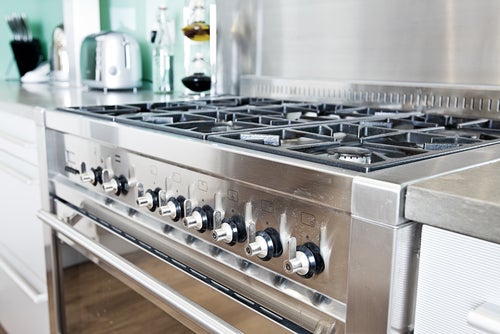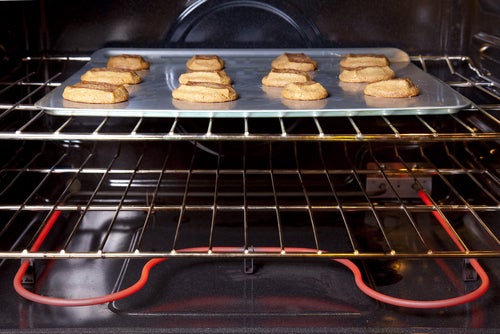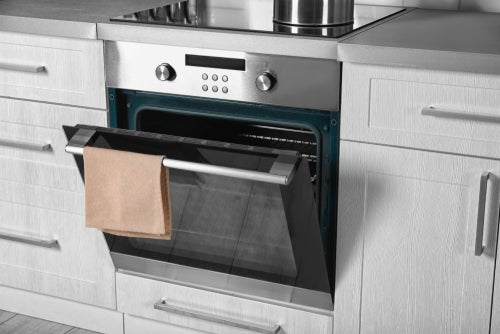What is the Best Oven for Baking? | American Home Shield

Have you been watching popular baking shows and want to create something of your own? Whether you dream of making a mouthwatering, sugar-spun confection or simply want to bake a cake for your child’s birthday, you may be wondering if your current oven is the best oven for baking at home.
Though the best oven for baking depends on your baking preferences and what you make most often, you can certainly create baked masterpieces no matter which model you have.
Here are some tips on finding the right oven for your kitchen, so you can officially get out those cookie molds and soufflé ramekins and get to cooking! We outline the pros and cons of gas, electric, and convection ovens to help you learn which one is best for you.
Mục Lục
Using a Gas Oven for Baking

Pros of a Gas Oven
- When considering an electric vs. a gas oven
- If your home is already equipped with a gas line, a gas oven may be more cost-effective to install than an electric oven.
Cons of a Gas Oven
- The internal temperature can fluctuate widely in a gas oven, so it doesn’t heat as evenly as electric or convection ovens.
- Most gas ovens have hot spots
- The inside of a gas oven tends to be more humid than other oven types, leading to issues with food browning and crisping.
Gas Oven Baking Tips
- Because of gas ovens’ notorious hot spots, it’s best to rotate your cooking trays during baking.
- To make your oven heat more evenly, place a baking stone on the floor or lowest rack of your oven. Don’t cook directly on the stone, though—it’s just there to even out the heat.
- Since it’s more humid in a gas oven, consider cooking items that you want more browned on the top rack or turning up the oven temperature by 25 degrees to get more crunch and crisp on the food.
- Avoid cooking in dark metal bakeware, which can cause your foods to burn at the bottom.
Using an Electric Oven for Baking

Pros of an Electric Oven
- Because the electric coils heat and cool slowly, there tend to be fewer spikes and drops in the temperature of an electric baking oven.
- The inside of an electric oven remains dry, which helps food crisp up and turn golden brown.
- Electric coils provide less intense heat, so you don’t have to worry as much about the undersides of your food burning.
- Electric ovens cost considerably less than gas ovens.
Cons of an Electric Oven
- Unlike gas heat, the electric coils take longer to heat up to the set temperature.
- Even the best electric oven for baking can easily cause your food to over-brown due to its dry heat.
Electric Oven Baking Tips
- Since the coils need some time to warm up, consider preheating longer than you may think necessary to ensure an optimal temperature.
- To avoid burning the food, loosely tent some aluminum foil over the top of the dish if you notice the edges or tips starting to brown too quickly.
- An electric oven’s “sweet spot” is in the center. For the most consistently cooked food, place the baking rack for the oven on the middle row.
Using a Convection Oven for Baking

Pros of a Convection Oven
- Because of the convection oven’s third heating element and fan, the hot air directly around the food is steadily maintained. This can be an asset when baking bread in the oven. Learn more about how a convection oven works
- Food cooks more quickly and evenly than in other ovens.
Cons of a Convection Oven
-
Ovens with a convection setting are generally more expensive than conventional ovens.
Convection Oven Baking Tips
- Because a convection oven cooks food so efficiently, lower the temperature that a recipe calls for by 25 degrees.
- Likewise, because your food tends to cook quicker, keep an eye on it, especially toward the end of the cooking time.
- To ensure the air circulates well, cook with low-sided pans.
- Avoid using a convection oven for baking anything fragile, such as a soufflé, as the air may blow the mixture around and distort the result.
After choosing the best oven for baking, consider investing in a warranty for your oven. A home warranty can help protect your budget when covered components of your oven, as well as other covered home systems and appliances, fail due to normal wear and tear. Learn more about American Home Shield® and what’s covered by our home warranty plans.
Learn more about how to extend your oven’s life span.
Do you need help with your Oven? AHS ProConnect offers Oven repair near you.















![Toni Kroos là ai? [ sự thật về tiểu sử đầy đủ Toni Kroos ]](https://evbn.org/wp-content/uploads/New-Project-6635-1671934592.jpg)


